I discovered that technology’s quest towards the unknown
requires us to accumulate more and more control,
whereas growing in virtue requires an altogether different capacity:
more and more surrender.
~Nipun Mehta
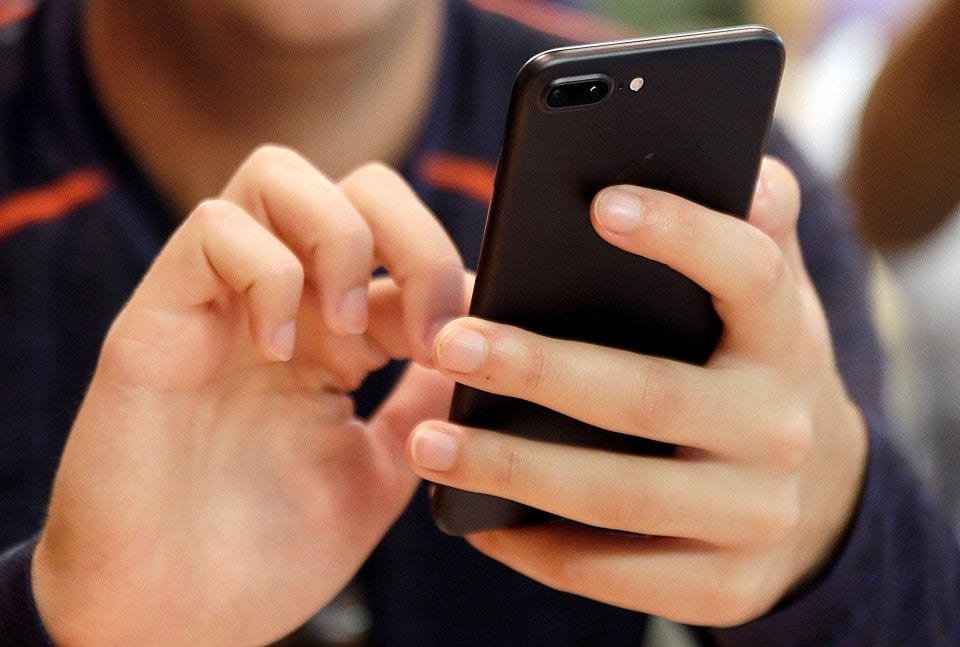
Believe it or not, I do not own smartphones. I’m not averse to technology. But I spend so much time on my computer engaged in research and writing that when I take a break from my work, I truly take a break. I want to be fully present in life without the temptation of looking at my smartphone. Instead of focusing on my phone, I walk down the street enjoying my surroundings and smiling at people as I pass by. If I need directions, I ask someone directly, engaging in real communication with another human being.
Along with the benefit of being engaged in life, removing myself from the seductive pull of technology frees up time for my mind to wander, which is essential to creative thought and wellbeing.
On average, people in the U.S. check their smartphones 46 times per day (up from 33 times per day in 2014). And it’s worse for users in the U.K. A study by Nottingham Trent University found that adults ages 18-33 checked their smartphones 85 times a day, or once every 10 minutes—and they don’t even know they are doing it.1
We are giving up our uniqueness as individuals, becoming mere facts and statistics plugged into technology and artificial intelligence. Many believe this is a good thing and will improve our lives. But as we create smarter robots that are increasingly human-like, humans are at the same time becoming more robot-like. What happens to the human spirit in this race for technology?
I am deeply concerned about the physical, emotional, and spiritual price we are paying for technology, which is advancing at a speed that is impossible for us to adjust to. Drug addiction, drug overdosing, and suicide are epidemic in our society, and feelings of isolation are a primary cause. Social interaction is emerging as perhaps the single most important factor to a long, healthy and happy life, but overdosing on technology leads to isolation, not interaction.
My new motto has become: “Together we heal.”
The entire purpose of technology, which for most people is their smart phone, is to create more freedom; however the reality has been just the opposite. For most people, smart phones are an addiction. Addiction is the opposite of freedom, and I cannot think of a single person that has more freedom now because of their smart phone. No one seems to have time anymore to just be, to be with others or to be silent within yourself to commune with your soul.
“The soul does not know itself by comparison and differentiation, it just is.”
~Richard Rohr
Recently, while walking in New York City, I said hello and spoke briefly to a man sweeping the sidewalk. He thanked me, looking directly into my eyes with kindness and appreciation. Moments like these connect us with others, and improve our individual wellbeing as well as the wellbeing of society. It does no good to nourish health only in the material sense (through diet, exercise, spas, vacations, and so on) if you are not first and foremost nourishing Spirit, with love in your heart and by serving. Life should not be focused on “me” but on “we,” concentrating on the pursuit of God, which is selfless love.
The Emotional Dangers of Smartphones
As I stated above, the use of smartphones is an addiction, and is likely the single major factor in the increase of depression, anxiety and suicide among teenagers in the United States.
According to a recent Blue Cross Blue Shield Association study, rates of depression increased 33 percent in America from 2013 to 2016, rising most dramatically among adolescents and millennials. The study found that depression increased 63 percent in adolescents (ages 12 to 17) and 47 percent in millennials (ages 18 to 34). According to estimates of people who are commercially insured, depression affects more than nine million people in the United States, with countless others affected who are not covered by insurance.2
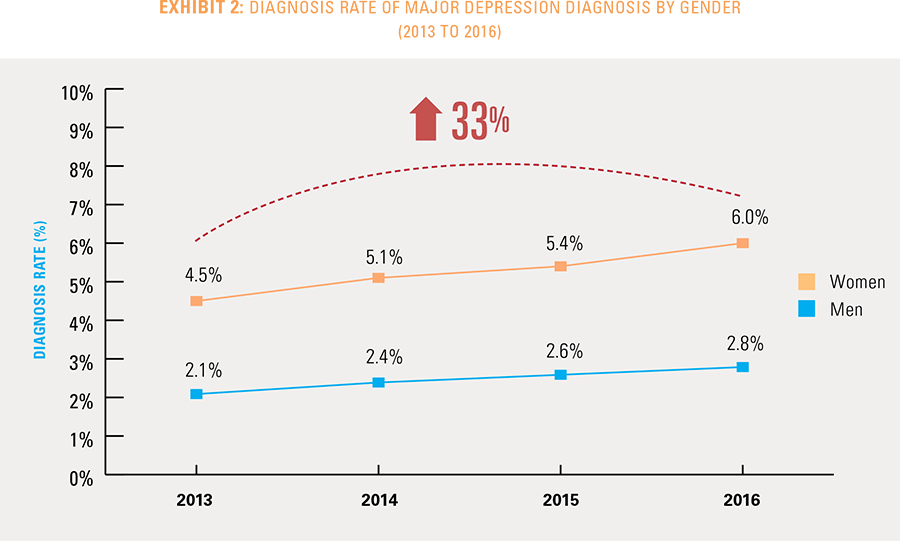
More Research Links Social Media to Depression and Loneliness
A recent study from University of Pennsylvania researchers found that restricting social media use to 10 minutes per day results in significant improvement in mood and outlook on life. This study is the first to identify a causal link between time spent on social media and depression.
The study, “No More FOMO: Limiting Social Media Decreases Loneliness and Depression,” is being published in the peer-reviewed Journal of Social and Clinical Psychology, Market Watch reports. (For those unfamiliar with the term, FOMO refers to “Fear of Missing Out.”) In the study, researchers used a variety of scales to evaluate mood and sense of wellbeing in 143 undergraduates at the University of Pennsylvania over the course of two semesters.
Half of the participants carried on using social media sites as normal, while the other half was restricted to 10 minutes per day for each of the three most popular sites for the age group, including Facebook, Instagram and Snapchat. To ensure accuracy, usage was tracked through regular screen shots from the participants’ phones showing battery data.
The results showed that those who limited their social media use saw a clinically significant decrease in depression and loneliness over the course of the study. At the same time, those in the control group who did not change their social media behavior experienced no improvement in mood.
Not surprisingly, studies show that nearly half of Americans experience loneliness, with younger generations feeling the loneliest. 3 Depression, anxiety, and sleep quality are all associated with smartphone overuse. 4,5
In a recent study of 688 undergraduate university students, depression and anxiety scores emerged as independent positive predictors of smartphone addiction. Rates of smartphone-related compulsive behavior, functional impairment, tolerance and withdrawal symptoms were substantial. More than one-third of the students reported decreased sleep quality, slept less than four hours due to smartphone use, and experienced daytime fatigue due to late-night smartphone use.6
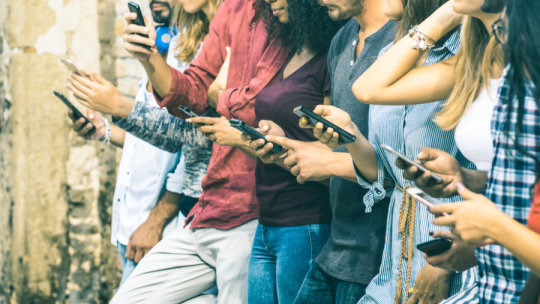
A 2018 study involving nearly 700 adolescents in Switzerland found that radiofrequency electromagnetic fields might have adverse effects on the development of memory performance of specific brain regions exposed during mobile phone use.
The study follows up a report published in the scientific journal Environment International in 2015 with twice the sample size and more recent information on the absorption of radiofrequency electromagnetic fields (RF-EMF) in adolescent brains during different types of wireless communication device use. These are the world’s first epidemiological studies to estimate cumulative RF-EMF brain dose in adolescents.7
Both studies found that cumulative RF-EMF brain exposure from mobile phone use over one year may have a negative effect on the development of figural memory performance in adolescents. Figural memory is mainly located in the right brain hemisphere and association with RF-EMF was more pronounced in adolescents using the mobile phone on the right side of the head.8
The Disturbing Relationship Between Teenage Suicide and Smartphones
According to Jean Twenge, PhD, a professor of psychology at San Diego State University who studies generational differences, the number of teenagers committing suicide has drastically increased since smartphones were introduced. A survey conducted among college students has shown that those who access Facebook more often tend to be unhappier. Increased depression is also observed among younger students who spend time on social media in lieu of joining sports activities, attending religious services, or even doing homework.
This trend is attributed to the ability of social media services to emphasize the teenager’s concern about being left out of their peer group, and is more often observed among people who spend greater amounts of time online and see their friends less often. The hypothesis is that teenagers document their activities heavily through their accounts, which results in increased feelings of being left out.
Heavy use of social media also negatively affects the sleeping habits of students, Ms. Twenge found. There is a substantial increase in the percentage of people who report sleeping less than seven hours a night since 2007, which is when the first iPhone was released. The lack of sleep is connected with reduced capacity to think and reason coherently, susceptibility to physical illnesses, and an increased risk of depression.9
The following charts from Dr. Twenge’s book iGen: Why Today’s Super-Connected Kids Are Growing Up Less Rebellious, More Tolerant, Less Happy—and Completely Unprepared for Adulthood—and What That Means for the Rest of Us graphically illustrate the changes in teenage behaviors since the iPhone was released in 2007:
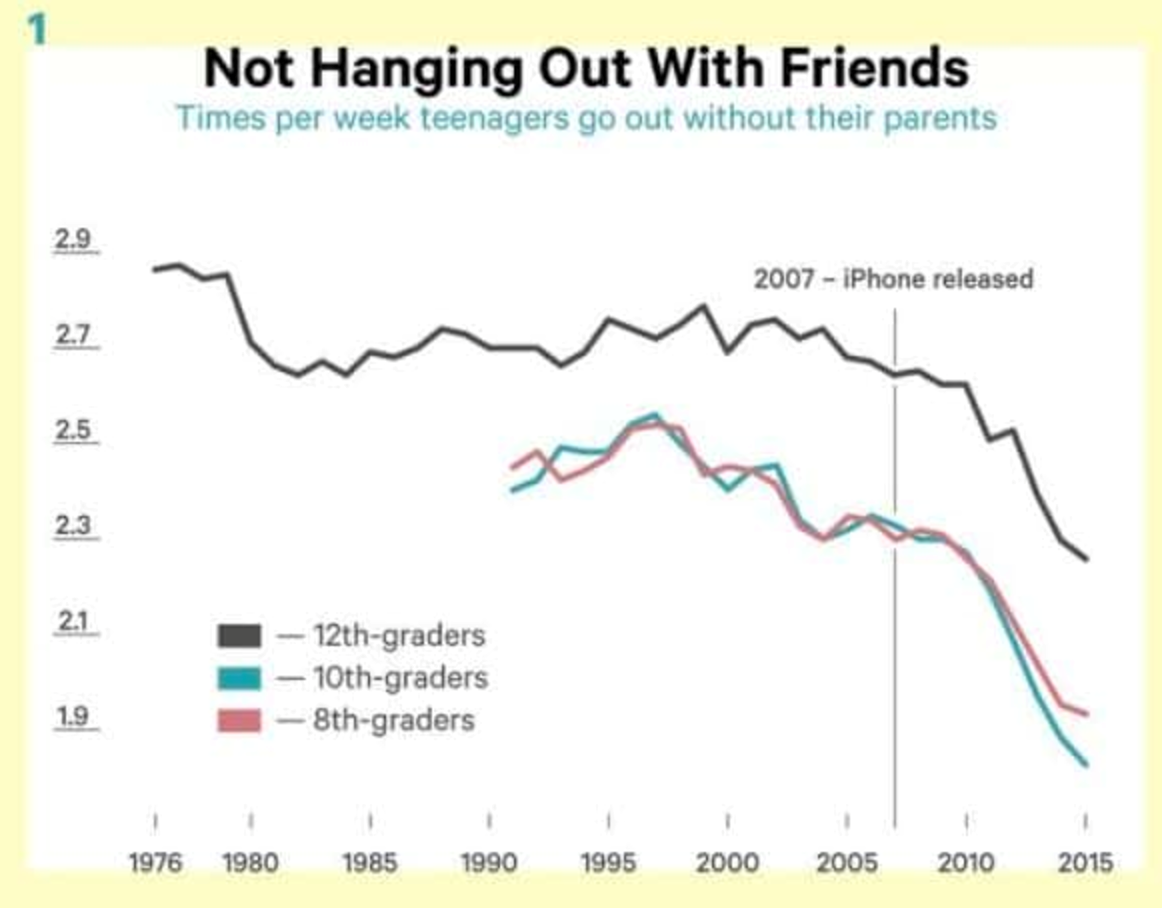
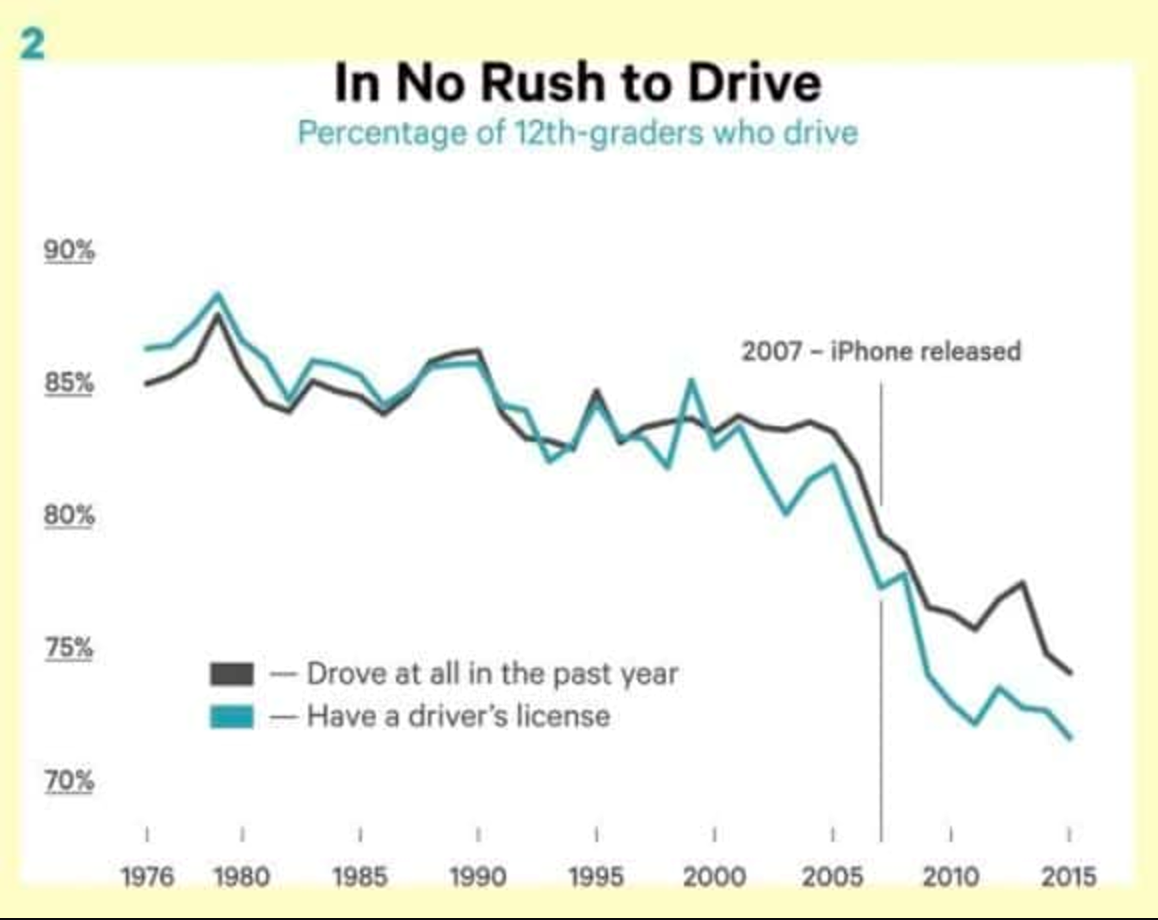
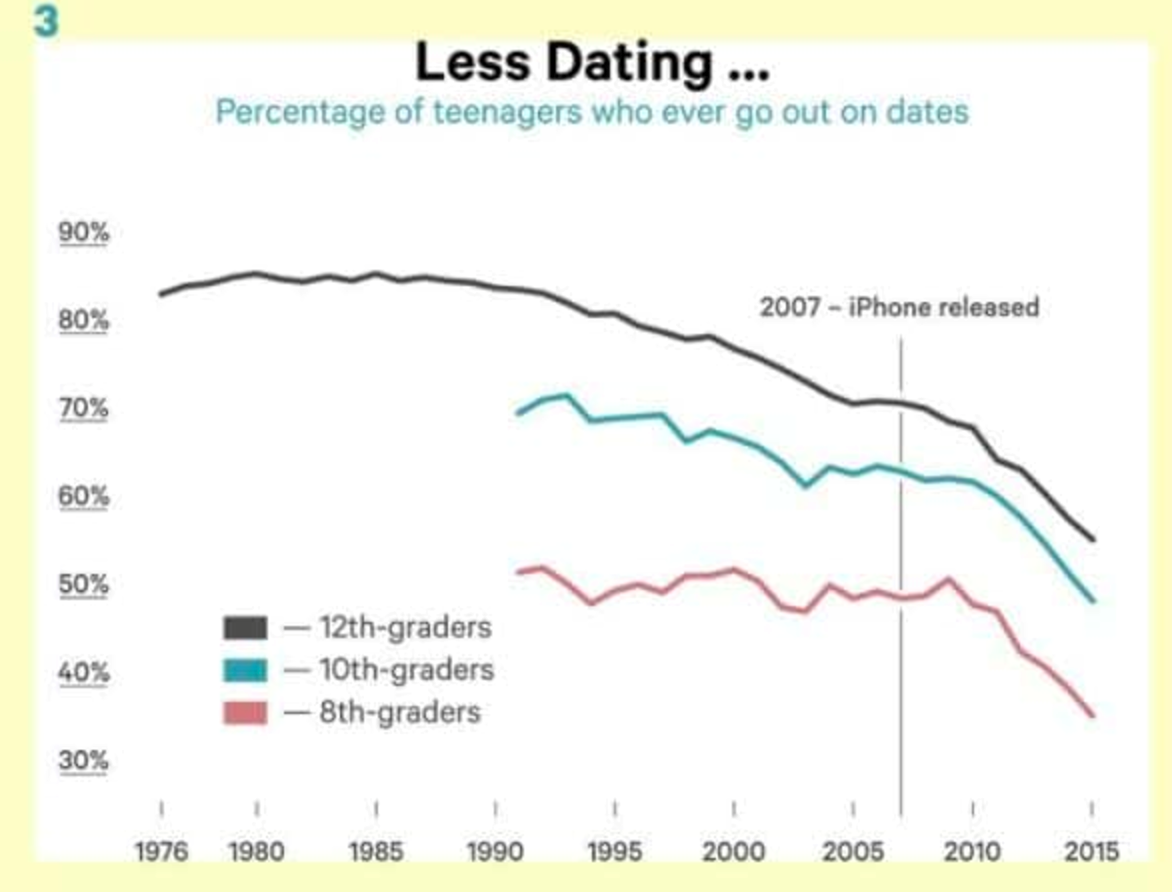
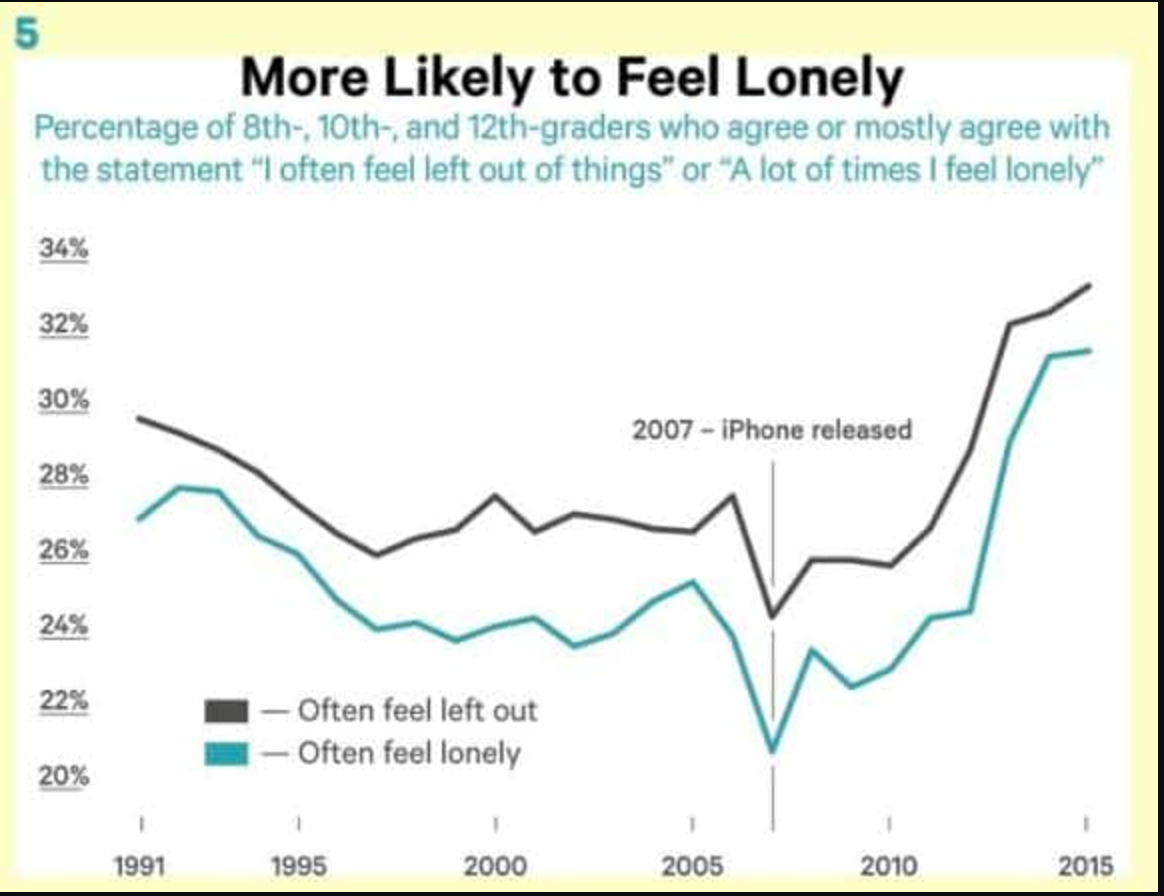
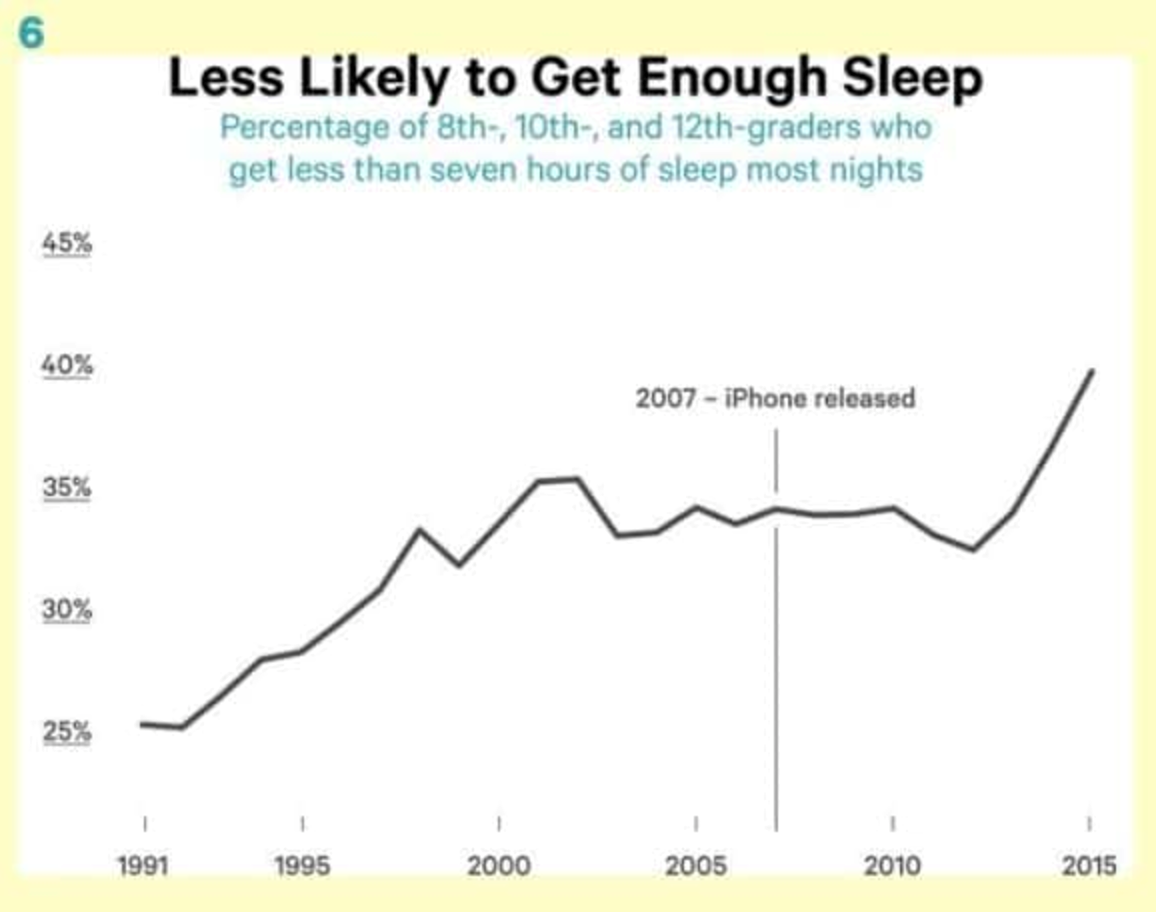
Other research also suggests that bedtime reading with a tablet or smartphone interferes with a good night’s sleep. In one study, researchers had nine people spend 10 nights in a sleep laboratory. For five consecutive nights, they read before sleep with an iPad; then they read print for five nights. In both scenarios, they read in a dimly lit room until they felt ready to go to sleep.
The experiment found that when people used iPads instead of reading print, they selected a later bedtime, had a later sleep onset, and had suppressed levels of melatonin.10
How Smartphones Affect The Brain—Even When The Phone is Turned Off
Researchers at the University of Texas have found that that simply having your smartphone near you reduces your brain function, even if the phone is turned off. In a study tracking the ability of how well people can complete tasks in the presence of their smartphones, researchers studied nearly 800 undergraduate students who were smartphone users.
In one experiment, participants were asked to take a series of tests that required full concentration in order to score well. Before beginning, they were instructed turn their phones to silent, and were randomly assigned to place their smartphones either on the desk face down, in their pocket or personal bag, or in another room.
The researchers discovered that participants with their phones in another room scored significantly better on the tests than those with their phones on the desk, and they also scored slightly better than those who had kept their phones in a pocket or bag.
The findings suggest that the presence of a smartphone reduces impairs cognitive functioning, even when people believe they’re giving their full attention and focus to the task at hand. Having a smartphone within sight or within easy reach impairs a person’s ability to focus because part of the brain is actively working to not pick up or use the phone.11
Smartphones, Muscle Spasms, and Poor Posture
Too much time spent looking down at a smartphone while texting or browsing can lead to a malady called “text neck.” Looking around, I often see people with their heads down, texting and browsing. This is an unnatural stance, and causes muscle strain, spasms, and eventually, serious neck and posture problems.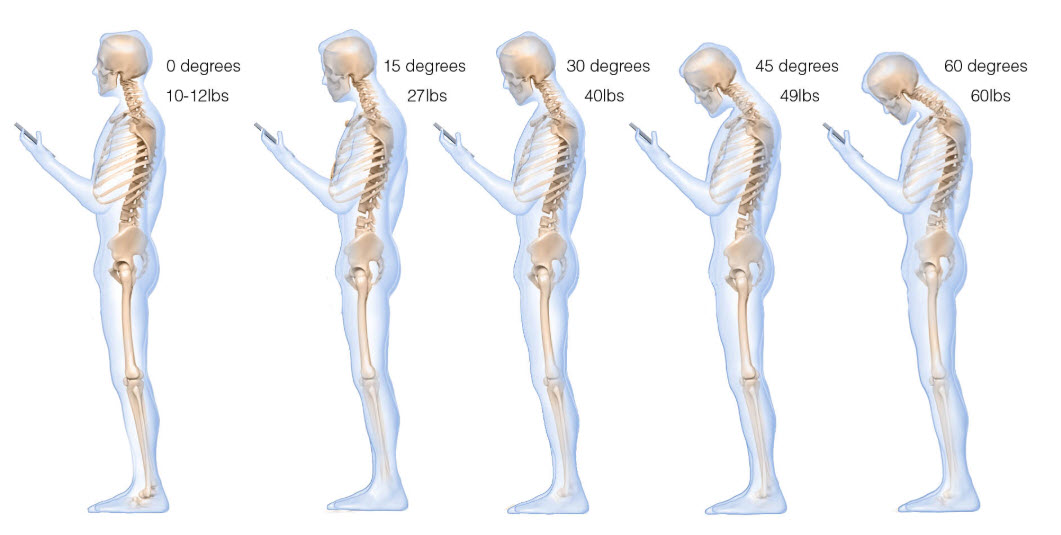
(Courtesy of Dr. Ken Hansraj M.D.)
The human head weighs almost 12 pounds, and when the neck is bent forward and down, weight increases on the cervical spine. At a 15-degree angle, the weight increases from 20 to 27 pounds, at 30 degrees it’s 40 pounds, at 45 degrees it’s 49 pounds, and at 60 degrees it’s 60 pounds!12
The takeaway message is to maintain good posture when you are using your smartphone. Hold your phone up in front of your body, and do not bend your neck forward or hunch over the screen.
Problematic Smart phone Use and Clinical Health Symptoms
There is a relationship between problematic smartphone use (PSU) and clinical health symptoms (e.g., body dysfunction) and the mediating effects of sleep quality in adolescents. Findings of a recent study published in the June 2018 issue of the Journal of Behavioral Addictions suggested that to promote health and wellness in adolescents, individuals should be encouraged to place boundaries on smartphone use, especially at bedtime.
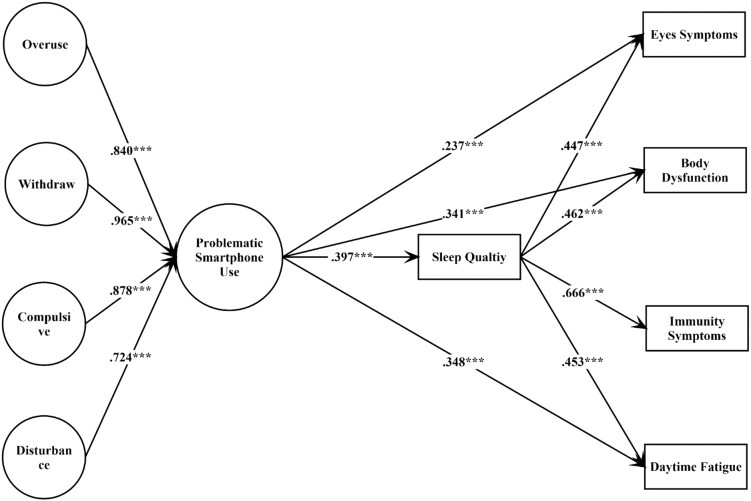
The results indicated that participants with higher PSU scores experienced poorer sleep, which in turn predicted increased symptoms of weakened immune function, daytime fatigue, body dysfunction, and eye discomfort. It is important to note that sleep quality fully mediated the association between PSU and immune symptoms.13
The Benefits of Giving Up Your Smartphone
I realize that most people are unwilling to completely give up their smartphones. I understand how convenient it is to have the benefits of technology at your fingertips at all times. But I encourage you to at least take a break from your smartphone every day—leave it behind while you go for a walk, or at the very least turn your phone off at regular intervals throughout the day. During that time, focus on your surroundings and enjoy engaging face to face with friends and acquaintances.

“It is by logic that we prove, but by intuition that we discover.” ~Henri Poincaré
Grand ideas come from times that we allow our minds to wander. Pings, notifications, and alerts from our smartphones interrupt the flow of mind wandering and distract us from our innate creativity. Notifications from our phones also cause a mild flight-or-fight response, and trigger the release of the stress hormones adrenaline and cortisol.
If you aren’t tied to your smartphone, you will find that your mind will be free to engage in creative wandering, your awareness and enjoyment of the moment will be enhanced, and your health and memory will benefit. And you’ll rediscover the joys of a life that is not tethered to technology.
“What you think you create, what you feel you attract, what you imagine you become.” ~Buddha
References:
- Andrews, S, Ellis D, Shaw, H, Piwekx, L. Beyond Self-Report: Tools to Compare Estimated and Real-World Smartphone Use. PLoS One. October 2015. https://doi.org/10.1371/journal.pone.0139004.
- https://www.bcbs.com/the-health-of-america/reports/major-depression-the-impact-overall-health, Retrieved June 8, 2018
- Hunt, Melissa G., Cutting social media time can lessen depression and loneliness. Journal of Social and Clinical Psychology. December 2018.
- Demirci K, Akgönül M, Akpinar A. Relationship of smartphone use severity with sleep quality, depression, and anxiety in university students. Behav Addict. 2015 Jun; 4(2):85-92.
- Choi SW, Kim DJ, Choi JS, Ahn H, Choi EJ, Song WY, Kim S, Youn HJ. Comparison of risk and protective factors associated with smartphone addiction and Internet addiction. Behav Addict. 2015 Dec; 4(4):308-14.
- Matar Boumosleh J. Jaalouk D. Depression, anxiety, and smartphone addiction in university students- A cross sectional study, PLoS One. 2017 Aug 4;12(8):e0182239. doi: 10.1371/journal.pone.0182239. eCollection 2017.
- Anna Schoeni, Katharina Roser, Martin Röösli. Memory performance, wireless communication and exposure to radiofrequency electromagnetic fields: A prospective cohort study in adolescents. Environment International, 2015; 85: 343 DOI: 10.1016/j.envint.2015.09.025
- Foerster M., Thielens A., Joseph W., Eeftens M., Röösli M. A prospective cohort study of adolescents’ memory performance and individual brain dose of microwave radiation from wireless communication. Environmental Health Perspectives, 2018 DOI: 10.1289/EHP2427.
- Twenge, J. M. (2017) iGen: Why Today’s Super-Connected Kids Are Growing Up Less Rebellious, More Tolerant, Less Happy–and Completely Unprepared for Adulthood–and What That Means for the Rest of Us.
- E. D. Chinoy et al. Unrestricted evening use of light‐emitting tablet computers delays self‐selected bedtime and disrupts circadian timing and alertness. Physiological Reports, Volume6, Issue10, May 2018. e13692, 22 May 2018, https://doi.org/10.14814/phy2.13692
- Ward A, Duke K, Gneezy A, Bos M. “Brain Drain: The Mere Presence of One’s Own Smartphone Reduces Available Cognitive Capacity,” Journal of the Association for Consumer Research 2, no. 2 April 2017: 140-154.
- Bever, Lindsey, ‘Text neck’ is becoming an ‘epidemic’ and could wreck your spine
https://www.washingtonpost.com/news/morning-mix/wp/2014/11/20/text-neck-is-becoming, Nov. 20, 2014, retrieved 2/10/2019.
- Xiaochun Xie, Yan Dong, and Jinliang Wang. Sleep quality as a mediator of problematic smartphone use and clinical health symptoms. J Behav Addict. 2018 Jun; 7(2): 466–472.
Published online 2018 May 15. doi: 10.1556/2006.7.2018.40


I also only use my smartphone when i travel,
good advise.
Thanks. Well researched and written. Social media is so addictive for young people and many people of all ages. I don’t get it. It must provide some sort of false comfort.
Dear Donnie,
I loved this. I wish my children and grandchildren wold realize the importance of this timely information.
My best,
Myrna
Fantastic and highly relevant post! thank you so much!
Thank you Donnie for so eloquently expressing the reasons I do not have and do not want a smart phone. I talk to people on the bus (yes, I do not drive either and love riding transit for the characters I meet). I talk to people in shops and on the street. I make eye contact. I smile.
Well, I try to at least but these days hardly anyone notices – they are all too busy with virtual reality to even notice the birds and flowers.
I agree with you/
I don’t have a smart phone, I work a lot on the computer, and I teach medicinal plants to several groups.
We don’t forget your visit in Israel
We’ll be happy to meet you again
Mina
thanks for this article – now i don’t have to write it …. so badly needed!!! julie
Thank you for addressing this topic, Donnie!
Yes, important information but what can possibly be done about what’s coming soon and is so so much more nefarious and deleterious.
http://treeoflifecenterus.com/5g-a-toxic-assault-on-the-planetary-web-of-life/?mc_cid=89974299e9&mc_eid=f56579e075